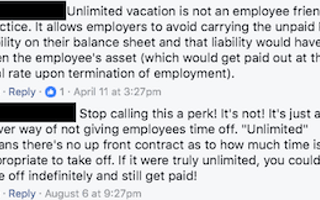Last April, we published a piece highlighting six Austin tech companies that offer open PTO policies to their employees. While many readers over social media offered praise, a handful spoke out against the policies and accused the companies of using it to play the system.
We heard you, Facebook commenters, so we confronted the companies directly with your feedback to give them a chance to respond. Here’s how they defended their unlimited vacation plans and some background as to why they created such a policy in the first place.
Dropoff’s CEO and co-founder Sean Spector said having well-rested and engaged employees at work leads to better results. For Dropoff, offering a flexible policy had everything to do with providing autonomy and flexibility to its employees.
How does an open PTO plan benefit the company and the employees?
We have a flexible policy because we want to invest in their personal lives. And we expect that investment to be mutual. In return for flexibility, we ask our employees to invest themselves in our mission and ensure their work gets done well, so our organization can continue to grow, our customers are supported, and our colleagues can balance their lives.
How would you respond to the following opinions:
"Employees end up taking less time off than more since it has to get approved."
We make an effort to remind employees to take time off. We’ve found that our employees value the flexible vacation policy.
"This is just a clever way of not giving employees time off."
Certainly not. Time off is a personal matter and differs greatly from person to person, year over year. If you ask a group of people how much time off they need, you’ll get very different answers. And those answers will likely change one year later for the same group of people. Work styles differ and personal lives evolve. These affect how much time off people need in order to lead healthy, productive lives. A flexible policy gives them the freedom to adapt to their circumstances.
"This is a way for companies to not have to pay for accrued days off when someone leaves the company."
That’s certainly not the driving factor behind implementing a flexible vacation policy. For prospective and existing employees, it’s important to us for them to know we value their lives outside of work and trust they will strike the right balance needed to perform at work.
Lizette Fleher, senior director of culture and engagement at RetailMeNot, said their CEO Cotter Cunningham initiated the open PTO policy following a previous work experience when an employee couldn’t take time off to visit a sick family member.
Why did your company elect to have such a flexible vacation policy?
When Cotter established RetailMeNot and our core values, he wanted to ensure that nobody felt they had to choose between their family or other obligations, and their job at RetailMeNot.
How does it benefit the company and the employees?
A flexible PTO plan not only provides the freedom to establish the work-life blend appropriate for oneself, it also establishes trust in each and every employee. All vacation time is approved at managers’ discretion. By indicating our employees are trusted with the freedom of establishing their own need for time off, we’re also indicating a greater trust in their ability to complete their job satisfactorily.
How would you respond to the following opinions:
"Employees end up taking less time off than more since it has to get approved.”
"This is just a clever way of not giving employees time off.”
"This is a way for companies to not have to pay for accrued days off when someone leaves the company."
We actively encourage our employees to take the time off that they need to recharge. Our open PTO plan maps back to one of our core values: transparency. We have this policy as an indicator of trust and belief in our employees to balance how they see fit between their lives and their jobs.
Marie Carroll, senior director of HR and operations of ActiveProspect, said they chose an unlimited PTO plan to remove the pressure from employees feeling like they need to save days or not take an unexpected trip. Carroll added they want their employees to enjoy their time at work as much as they do off with their families and friends.
How does it benefit the company and the employees?
The policy keeps our team happy. There also isn't as much administration in terms of tracking time off to see who has gone over or who has not taken time off, etc.
How would you respond to the following opinions:
"Employees end up taking less time off than more since it has to get approved."
Even standard vacation policies normally require approval. For us, approval is a formality and also a way to indicate to team leaders who is out when and plan for work.
"This is just a clever way of not giving employees time off."
Our employees take a healthy amount of vacation each year. Our culture encourages everyone to take time off to enjoy life. We even have a Live Music Capital holiday to encourage our team to enjoy music events in their cities.
"This is a way for companies to not have to pay for accrued days off when someone leaves the company."
Time off is necessary for employees’ well-being. Most companies [that] allocate a number of days often have a "cap" on the amount of carry over from one year to the next. This cap is designed to encourage people to take time off and rejuvenate. Everyone needs a break from time to time. Stockpiling vacation for an eventual payout does not really benefit the employee in the end.
Images provided by companies.
Does your company offer cool perks? Let us know with a tip or on Twitter @BuiltInAustin




